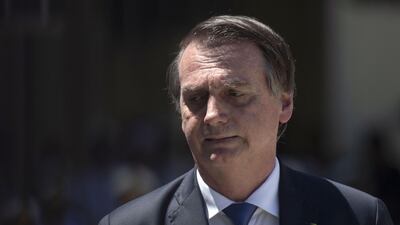One of the world’s most enthusiastic students of US President Donald Trump’s turbulent, Twitter-based style of government will finally meet the master on Tuesday when Brazil’s head of state visits the White House.
For Jair Bolsonaro, who revels in the “Trump of the Tropics’’ moniker, the trip brings the chance to drum up business for Brazil and relaunch his image after an underwhelming debut at the World Economic Forum in Davos.
Mr Trump, on the other hand, will relish the attention of an unabashed fan and ally in his combative approach toward China.
Few, if any, Latin American presidents have embraced a US leader with as much fervour as Mr Bolsonaro, whose politician son Eduardo recently addressed a Trump rally in Florida, urging the crowd to “build that wall".
Bolsonaro Jr is now president of the lower house’s foreign affairs and defence committee.
But while the affection appears mutual, the Trump administration has yet to offer the Brazilian government much more than supportive tweets.
“Brazil only stands to gain from a closer relationship with the US,” Foreign Minister Ernesto Araujo said.
“In the past there were limits to the relationship with the US on the pretext of avoiding subservience, but that’s a great fallacy.”
Two deals appear close to fruition. One would pave the way for US companies to explore Brazil for uranium and invest in new nuclear power plants, while the other involves commercial use of the Alcantara rocket launch site.
The US has long been eager to use the base but Brazil has been reluctant to lease sovereign land to a foreign power without oversight of the sensitive technology involved.
One of Brazil’s main hopes for this trip is that the US will formally endorse its bid to join the Organisation for Economic Co-operation and Development, and declare the country a major non-Nato ally.
In return, Brazil could scrap the visa requirements for visiting US citizens.
Preliminary talks on future trade deals are also likely, but for the Brazilians the trip is at least as much about the image as the substance.
For the US, talks between the leaders will focus on defence co-operation, ways to fight transnational crime, and Venezuela, White House press secretary Sarah Sanders said.
While the crisis in Venezuela is also a priority for Brazil, a military intervention is not on the cards, said Brazil’s ambassador to Washington, Sergio Amaral.
Instead, the two countries will discuss ways to increase the pressure on Venezuelan President Nicolas Maduro.
China is also a common concern for both leaders. While Mr Bolsonaro has toned down much of his anti-Beijing speech, he is deeply wary of Chinese interests in Latin America.
“We see this as a historic opportunity for Brazil and the United States to work together across a whole host of areas, economics, security and a range of others,” US National Security Adviser John Bolton said.

